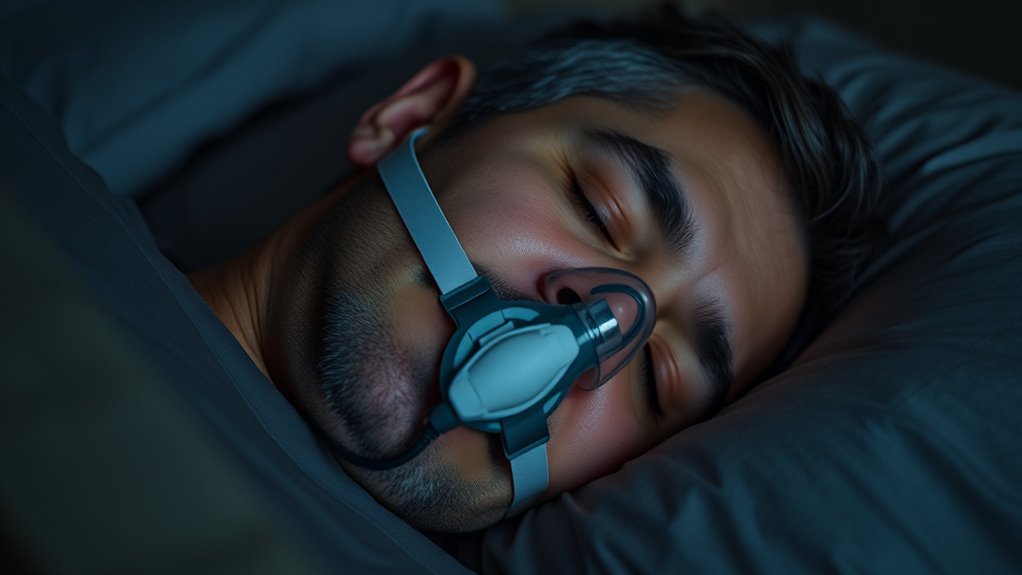Sleep apnea raises your risk of heart problems and high blood pressure by disrupting sleep and causing repeated drops in oxygen levels. These episodes stress your cardiovascular system, increase blood pressure spikes, and strain your heart. Over time, this can lead to arrhythmias, artery damage, and heart failure. Recognizing symptoms and managing sleep apnea early can protect your heart health—learn more about how to keep your heart safe from sleep-related issues.
Key Takeaways
- Sleep apnea causes repeated oxygen drops, increasing the risk of hypertension, arrhythmias, and heart failure.
- Breathing interruptions activate stress hormones, leading to elevated blood pressure and cardiovascular strain.
- Untreated sleep apnea damages blood vessels, promotes inflammation, and accelerates atherosclerosis.
- Disrupted sleep increases inflammation and oxidative stress, heightening long-term cardiovascular disease risk.
- Proper management with CPAP and lifestyle changes reduces cardiovascular risks associated with sleep apnea.
Understanding Sleep Apnea: Types and Causes

Sleep apnea occurs when your breathing repeatedly stops and starts during sleep, disrupting your rest and affecting overall health. There are two main types: obstructive sleep apnea (OSA) and central sleep apnea (CSA). OSA happens when your throat muscles relax too much, blocking airflow. It’s the more common type and often linked to obesity, large neck size, or a narrow airway. CSA is less common and occurs when your brain fails to send proper signals to your muscles that control breathing. Factors like heart failure or neurological conditions can cause CSA. Sometimes, people experience complex sleep apnea, which combines both types. Understanding these differences helps you recognize potential risks and triggers, so you can seek appropriate treatment and improve your sleep quality. Cybersecurity vulnerabilities during events like outages can also impact medical device safety and patient data security.
How Sleep Apnea Affects Heart Health

When you have sleep apnea, your blood pressure can spike suddenly and frequently during the night, putting extra strain on your heart. These breathing interruptions can also cause irregular heart rhythms, which increase your risk of serious cardiovascular issues. Understanding how these changes impact your heart is key to protecting your health. Additionally, managing sleep disorders effectively can reduce the risk of developing further complications.
Blood Pressure Spikes
Because sleep apnea causes repeated airway blockages during the night, your body responds with sudden surges in blood pressure. These spikes happen as your body tries to force air through a blocked airway, triggering a stress response. Over time, frequent blood pressure surges strain your cardiovascular system, increasing your risk of hypertension and heart problems. Understanding how these spikes occur can help you recognize the importance of treatment. Additionally, trust issues that develop from sleep disturbances can impact your overall relationship health.
Heart Rhythm Disruptions
The repeated blood pressure spikes caused by airway blockages during sleep not only strain your cardiovascular system but also disrupt your heart’s normal rhythm. These frequent interruptions can lead to abnormal heartbeats, such as arrhythmias, which increase your risk of stroke and other complications. When your oxygen levels drop, your heart compensates by beating irregularly to maintain blood flow. Over time, this stress weakens your heart’s electrical system, making arrhythmias more likely. Sleep apnea prevents your heart from resting properly, leading to a higher chance of developing atrial fibrillation or other rhythm disturbances. If left untreated, these disruptions can considerably impact your heart health, emphasizing the importance of managing sleep apnea to protect your heart’s rhythm and overall well-being.
The Connection Between Sleep Disruption and Cardiovascular Disease

When your sleep is disrupted by frequent awakenings, your body experiences increased stress on the cardiovascular system. Blood pressure tends to fluctuate more, putting additional strain on your arteries and heart. These interruptions can considerably raise your risk of developing cardiovascular disease over time. Additionally, sleep disturbances may impair system security, leading to increased vulnerability to health-related issues.
Sleep Fragmentation Effects
Sleep fragmentation, characterized by frequent awakenings and disrupted sleep cycles, directly impacts your cardiovascular health. When your sleep is repeatedly interrupted, your body releases stress hormones like cortisol, which increase inflammation and strain your heart. Over time, this can lead to issues such as arterial damage and higher risk of heart disease. To understand the effects better, consider:
- Increased heart rate variability during disrupted sleep
- Elevated levels of inflammatory markers
- Impaired blood vessel function
- Greater likelihood of developing arrhythmias
These factors create a cycle where poor sleep worsens cardiovascular health, emphasizing how essential uninterrupted sleep is for your heart’s well-being. Recognizing sleep fragmentation’s role can help you take steps to improve your sleep quality and reduce cardiovascular risks.
Blood Pressure Fluctuations
Frequent awakenings during sleep don’t just fragment your rest—they also cause your blood pressure to fluctuate unpredictably. When you experience disrupted sleep, your body responds by activating stress responses that spike blood pressure levels unexpectedly. These sudden surges strain your arteries and heart, increasing your risk of hypertension and cardiovascular problems over time. Sleep disruptions also prevent your blood pressure from following its normal nightly dips, which are pivotal for heart health. Instead, your blood pressure remains elevated or fluctuates wildly, putting additional stress on your cardiovascular system. Over time, these repeated fluctuations weaken blood vessel walls and promote atherosclerosis. Recognizing how sleep interruptions influence blood pressure underscores the importance of treating sleep apnea to protect your heart health and prevent long-term cardiovascular disease. Additionally, the role of contrast ratio in visual displays highlights the importance of stability and clarity, much like maintaining consistent blood pressure is vital for cardiovascular health.
Recognizing Symptoms and Risk Factors

Understanding the symptoms and risk factors of sleep apnea is essential for early detection and prevention. Recognizing the signs can help you seek treatment sooner and reduce health risks. Common symptoms include loud snoring, choking or gasping during sleep, morning headaches, and daytime fatigue. Risk factors often involve obesity, a large neck circumference, a family history of sleep apnea, and being male or over 40 years old. You should also watch for signs like restless sleep or difficulty concentrating. Being aware of these symptoms and risk factors allows you to discuss concerns with your healthcare provider promptly. Early diagnosis can lead to effective management and reduce the likelihood of developing cardiovascular complications associated with sleep apnea.
The Role of Oxygen Deprivation in Heart Strain

Oxygen deprivation caused by sleep apnea places significant stress on your heart, forcing it to work harder to meet the body’s oxygen demands. When your airway becomes blocked, your blood oxygen levels drop, signaling your heart to pump faster and more forcefully. This increased workload can lead to the thickening of your heart muscle and weaken your cardiovascular system over time. Repeated episodes of low oxygen levels cause inflammation and damage to your blood vessels, making them less flexible and more prone to plaque buildup. As your heart strains to compensate, your risk of developing arrhythmias, heart failure, and other cardiovascular problems rises. Recognizing this connection emphasizes the importance of addressing sleep apnea to protect your heart’s health and prevent long-term damage. Enhanced natural language processing improves human-computer interaction, allowing for better diagnosis and management of sleep-related conditions.
Impact of Sleep Apnea on Blood Pressure

Sleep apnea markedly impacts blood pressure by causing repeated pauses in breathing during sleep. These interruptions trigger your body’s stress response, leading to spikes in blood pressure. Over time, this can cause sustained hypertension, increasing your risk of heart problems. Here’s what happens:
- Your body perceives low oxygen levels, activating stress hormones like adrenaline.
- Blood vessels constrict to redirect blood flow, raising blood pressure.
- The repeated effort to breathe causes fluctuations in blood pressure levels.
- These frequent surges contribute to long-term hypertension, damaging your cardiovascular system.
- Research into sound therapy suggests that certain sound frequencies may help promote relaxation and reduce stress responses associated with sleep disturbances.
Understanding this connection highlights the importance of diagnosing and managing sleep apnea to prevent persistent high blood pressure and related health risks. Addressing sleep apnea can profoundly improve your blood pressure control and overall heart health.
Long-term Cardiovascular Complications of Sleep Apnea

Repeated blood pressure spikes caused by sleep apnea don’t just affect your nightly rest; they also set the stage for serious long-term cardiovascular problems. Over time, these repeated stress events damage your arteries, increasing your risk of hypertension, heart disease, and stroke. The constant oxygen deprivation during apnea episodes promotes inflammation and arterial stiffening, making your heart work harder. This ongoing strain can lead to the development of arrhythmias and heart failure. If left untreated, sleep apnea’s effects accumulate, markedly raising your chances of cardiovascular events. Recognizing these risks emphasizes the importance of effective diagnosis and management. Additionally, the noise levels of modern heat pumps used for home heating and cooling can impact sleep quality and overall health. Addressing sleep apnea early can help you prevent these long-term complications and protect your heart health for years to come.
Diagnostic Methods for Sleep-Related Breathing Disorders

Diagnosing sleep-related breathing disorders involves a variety of methods designed to identify disruptions in your breathing patterns during sleep. The most common approach is a sleep study, or polysomnography, which records brain activity, eye movements, airflow, oxygen levels, and chest movements overnight. This extensive test helps determine if you have sleep apnea and its severity.
Other methods include:
- Home Sleep Apnea Testing (HSAT): A simplified version you can do at home, measuring breathing, airflow, and oxygen levels.
- Pulse Oximetry: Monitors your oxygen saturation during sleep to detect drops indicating breathing issues.
- Questionnaires: Tools like the STOP-Bang assess risk factors based on your symptoms and health history.
- Clinical Evaluation: Your healthcare provider examines your medical history and symptoms to guide diagnosis.
Strategies for Managing Sleep Apnea to Protect Your Heart

Effective management of sleep apnea is crucial to reducing its impact on your heart health. The most common treatment is using a CPAP machine, which keeps your airway open during sleep. Consistently using your device can lower blood pressure and decrease strain on your heart. Lifestyle changes also make a big difference; losing excess weight, quitting smoking, and avoiding alcohol improve sleep quality. Regular exercise and a healthy diet support overall cardiovascular health. In some cases, your doctor might recommend oral appliances or surgery to correct airway obstructions. It is vital to follow your treatment plan and attend regular check-ups. Managing sleep apnea effectively can considerably reduce your risk of heart-related complications and improve your overall well-being. Additionally, emerging AI-driven solutions show promise in diagnosing and tailoring treatments for sleep-related breathing disorders.
Frequently Asked Questions
Can Sleep Apnea Be Cured Completely?
You might wonder if sleep apnea can be completely cured. While some treatments, like lifestyle changes or devices such as CPAP, improve symptoms markedly, they don’t typically eliminate the condition entirely. In certain cases, surgery can provide a permanent fix. However, success varies depending on individual factors. So, it’s best to work closely with your healthcare provider to find the most effective approach for managing your sleep apnea.
How Does Age Influence Sleep Apnea and Heart Risk?
When considering how age influences sleep apnea and heart risk, you realize that as you get older, your risk increases. You might notice sleep becomes more disrupted, and your heart health could decline. Age affects muscle tone, airway flexibility, and overall health, making sleep apnea more common and harder to manage. Recognizing these changes helps you stay proactive, seek treatment early, and protect your heart as you age.
Are There Specific Foods That Worsen Sleep Apnea?
Certain foods can worsen sleep apnea symptoms. If you eat heavy, fatty, or processed foods, your airway may become more obstructed due to increased inflammation and weight gain. Avoid large meals close to bedtime, as they can cause reflux and disrupt sleep. Alcohol and sedatives relax your throat muscles, making breathing more difficult. Instead, focus on a balanced diet rich in fruits, vegetables, and lean proteins to support better sleep quality.
What Are the Latest Treatments for Severe Sleep Apnea?
Imagine reclaiming peaceful nights—today’s treatments for severe sleep apnea offer hope. You might try continuous positive airway pressure (CPAP) therapy, which keeps your airways open effortlessly. Alternatives include custom oral devices that gently reposition your jaw or, in some cases, surgery to remove obstructions. Consult your doctor to explore these options and find the best path back to restful sleep and renewed significance.
Can Exercise Help Reduce Cardiovascular Risks Associated With Sleep Apnea?
You might wonder if exercise can lower health risks. Regular physical activity improves your cardiovascular health by strengthening your heart and reducing blood pressure. It can help you maintain a healthy weight, which lessens strain on your heart and lungs. While exercise alone isn’t a cure, incorporating it into your routine supports overall heart health and can mitigate some risks linked to sleep apnea. Always consult your doctor before starting new exercises.
Conclusion
If you have sleep apnea, you’re twice as likely to develop heart problems, so don’t ignore it. Addressing sleep apnea can markedly lower your risk of cardiovascular disease and improve your overall health. Remember, nearly 25% of adults experience sleep apnea symptoms, but many go undiagnosed. Taking steps to manage your sleep health isn’t just about better rest—it’s about protecting your heart for the long run. Sleep well, and keep your heart happy!









